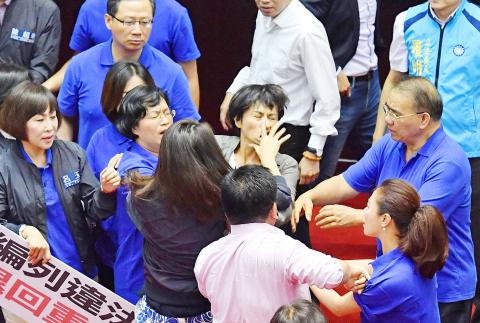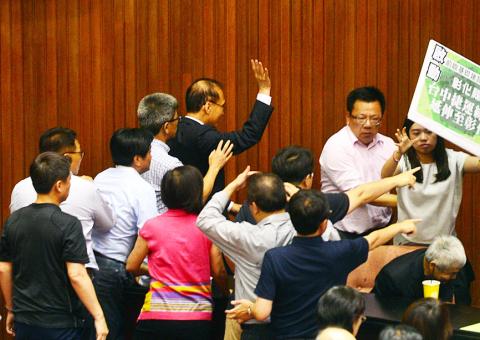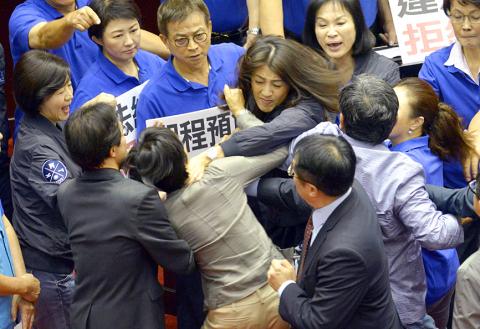Scuffles broke out at the legislature yesterday before Premier Lin Chuan (林全) was scheduled to brief legislators on the budget for the Forward-looking Infrastructure Development Program.
In one of the more dramatic moments Chinese Nationalist Party (KMT) Legislator Hsu Shu-hua (許淑華) slapped Democratic Progressive Party (DPP) Legislator Chiu Yi-ying (邱議瑩) across the face.
Legislators in the morning signed up to speak about the program during a legislative discussion preceding the first meeting of the second extraordinary legislative session, which began yesterday.

Photo: CNA
KMT secretary-general Lin Wei-chou (林為洲), the last KMT legislator to speak, gave KMT legislators a cue and they flocked to the front of the chamber to occupy the podium where Lin Chuan was scheduled to make his presentation.
Sounding air horns, blowing whistles and brandishing placards, KMT legislators said that the program, which has a budget of NT$420 billion (US$13.82 billion), would cause future generations to be mired in debt.
“Illegal budgeting. Block the review. Money-blowing premier. Lin Chuan step down,” they shouted.

Photo: Wang Yi-sung, Taipei Times
Legislative Speaker Su Jia-chyuan (蘇嘉全) tried to quell the protest by admonishing the KMT legislators, but his efforts were in vain.
A skirmish broke out between Chiu and Hsu when Chiu approached the KMT legislators and began pulling at a microphone that KMT caucus vice secretary-general Lee Yen-hsiu (李彥秀) was holding.
Hsu — in an apparent attempt to separate the two — joined the fray and soon became entangled with Chiu.

Photo: Sam Yeh, AFP
Hsu slapped Chiu across the face. Chiu responded by pulling her hair.
The two were separated by their colleagues, but that did not stop Chiu from scuffling with other KMT legislators, including Lee, KMT caucus whip Lin Te-fu (林德福) and KMT Legislator Huang Chao-shun (黃昭順).
The KMT caucus formed a blockade around the podium, but Su attempted to let Lin Chuan make the presentation nonetheless, prompting KMT lawmakers start throwing brochures, water balloons and fake banknotes in the premier’s direction.
Seeing that the proceedings had been paralyzed, Su advised the premier to leave, before announcing that the meeting would be reconvened today.
Hsu later said that her actions were meant to protect Lee and were inadvertent, and that she would like to apologize to society.
She said that she would be mindful of her interactions with her DPP colleagues from now on, but refused to apologize to Chiu, who she said had acted in a “provocative” manner.
The KMT’s “barbaric” boycott “belittled the legislature and bullied Taiwan,” Chiu said on Facebook.
Following a halt in the proceedings, Su in the afternoon session hastily put the DPP’s proposed agenda to a vote, which secured the majority backing of the DPP caucus.
The issues to be discussed during the extraordinary session included the Cabinet’s budget proposals for projects under the Forward-looking Infrastructure Development Program and a proposed amendment to the Mining Act (礦業法).

CHAOS: Iranians took to the streets playing celebratory music after reports of Khamenei’s death on Saturday, while mourners also gathered in Tehran yesterday Iranian Supreme Leader Ayatollah Ali Khamenei was killed in a major attack on Iran launched by Israel and the US, throwing the future of the Islamic republic into doubt and raising the risk of regional instability. Iranian state television and the state-run IRNA news agency announced the 86-year-old’s death early yesterday. US President Donald Trump said it gave Iranians their “greatest chance” to “take back” their country. The announcements came after a joint US and Israeli aerial bombardment that targeted Iranian military and governmental sites. Trump said the “heavy and pinpoint bombing” would continue through the week or as long

TRUST: The KMT said it respected the US’ timing and considerations, and hoped it would continue to honor its commitments to helping Taiwan bolster its defenses and deterrence US President Donald Trump is delaying a multibillion-dollar arms sale to Taiwan to ensure his visit to Beijing is successful, a New York Times report said. The weapons sales package has stalled in the US Department of State, the report said, citing US officials it did not identify. The White House has told agencies not to push forward ahead of Trump’s meeting with Chinese President Xi Jinping (習近平), it said. The two last month held a phone call to discuss trade and geopolitical flashpoints ahead of the summit. Xi raised the Taiwan issue and urged the US to handle arms sales to

BIG SPENDERS: Foreign investors bought the most Taiwan equities since 2005, signaling confidence that an AI boom would continue to benefit chipmakers Taiwan Semiconductor Manufacturing Co’s (TSMC, 台積電) market capitalization swelled to US$2 trillion for the first time following a 4.25 percent rally in its American depositary receipts (ADR) overnight, putting the world’s biggest contract chipmaker sixth on the list of the world’s biggest companies by market capitalization, just behind Amazon.com Inc. The site CompaniesMarketcap.com ranked TSMC ahead of Saudi Aramco and Meta Platforms Inc. The Taiwanese company’s ADRs on Tuesday surged to US$385.75 on the New York Stock Exchange, as strong demand for artificial intelligence (AI) applications led to chip supply constraints and boost revenue growth to record-breaking levels. Each TSMC ADR represents

Pro-democracy media tycoon Jimmy Lai’s (黎智英) fraud conviction and prison sentence were yesterday overturned by a Hong Kong court, in a surprise legal decision that comes soon after Lai was jailed for 20 years on a separate national security charge. Judges Jeremy Poon (潘兆初), Anthea Pang (彭寶琴) and Derek Pang (彭偉昌) said in the judgement that they allowed the appeal from Lai, and another defendant in the case, to proceed, as a lower court judge had “erred.” “The Court of Appeal gave them leave to appeal against their conviction, allowed their appeals, quashed the convictions and set aside the sentences,” the judges